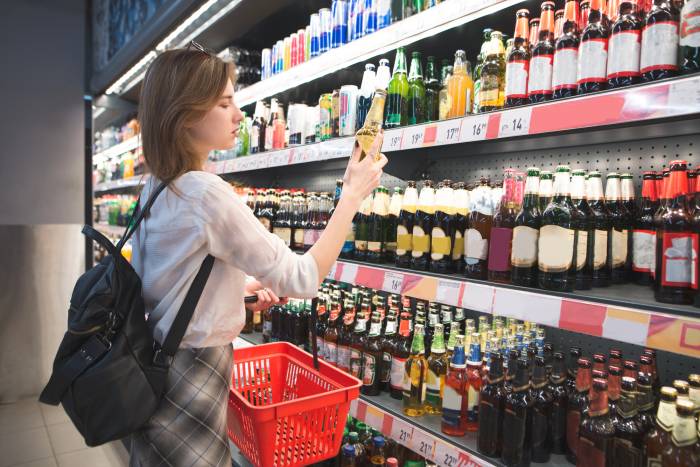
杰富瑞(Jefferies)最近发布的截至 11 月 1 日的四周数据显示,美国烈酒市场去高端化的趋势仍在继续,但细节显示的情况比标题数字所显示的更为复杂。即饮(RTD)市场正在迅速扩大,市场份额同比增长了 383 个基点。这一增长对传统蒸馏酒的整体价格和组合表现产生了重大影响。
Jefferies 强调指出,ABI 旗下的 Cutwater 品牌不仅是 RTD 增长的最大贡献者,也是整个烈酒行业增长的最大贡献者。RTDs的激增反映了美国饮酒习惯的广泛转变,Jefferies一直在对这一转变进行监测,这也是其正在进行的 "酒精的未来 "研究的一部分。
蒸馏酒的整体增长率低于历史平均水平。根据杰富瑞的数据,尼尔森的最新数据显示,行业产值下降了约 4%,低于美国蒸馏酒理事会(DISCUS)报告的 2024 年增速。消费者越来越多地选择伏特加和朗姆酒等价格较低的酒类,而杜松子酒和威士忌在较高价位上仍有一定优势。龙舌兰酒仍处于两者之间,消费者现在更青睐 "负担得起的优质 "品牌,而不是豪华瓶装酒。
杰富瑞(Jefferies)指出了影响当前美国烈酒去高端化周期的 27 个因素。其中,宏观经济压力尤为突出。酒类是消费者支出中最可自由支配的项目之一,而持续的通货膨胀正促使许多美国人选择价格较低的酒类。
自 COVID-19 以来,人们对健康的关注和态度的转变也起到了一定的作用。健康信息的增加、新法规的出台以及 GLP-1 药物的流行都在影响着人们对酒精消费的看法。Jefferies 指出,这些因素为该类产品的未来增加了不确定性。
文化转变是另一个影响因素。年轻消费者正在探索酒精的替代品,包括大麻和无酒精饮料,从而引发了酒精在社会中的作用是否正在发生变化的问题。
业界对这些挑战的反应不一。杰富瑞建议,各品牌可能需要更灵活的创新和营销策略,才能在低迷时期保持相关性。
尽管存在这些不利因素,但一些烈酒品类在价格和组合方面表现出了韧性。杜松子酒的销量增长了 2.1%,高于之前的 1.9%。波旁酒小幅上涨了 0.2%,苏格兰威士忌上涨了 1.8%。伏特加和朗姆酒走势平缓,干邑和加拿大威士忌继续面临压力。
龙舌兰酒在经历了多年的快速增长后,正在经历放缓。该品类在 11 月份下降了 3.7%,与 10 月份的表现持平。主要品牌如唐胡里奥(Don Julio)下降了 3.7%,而卡萨米戈斯(Casamigos)和帕特龙(Patrón)则出现了两位数的下降。虽然销量有所下降,但龙舌兰酒的总体趋势仍然是向上的,只不过现在是向更容易获得的高端产品而不是高端品牌发展。
威士忌仍然是大趋势中的一个例外。苏格兰威士忌的销量下降了 11%,但其高端化趋势仍在继续,价格/混合比提升了 1.8%。爱尔兰威士忌似乎更为稳定;詹姆森威士忌的销量最近才略有下降。在美国威士忌中,Colonel Taylor 等高端品牌正在推动增长,而 Jack Daniel's 和 Jim Beam 等主流品牌则分别下降了 4.6% 和 6.3%。
加拿大威士忌也感受到了这种重启的影响,皇家皇冠威士忌在 11 月份下降了 8.7%。杰富瑞预计,随着各品牌推出新产品,这一细分市场将出现波动。
伏特加的价格/组合已趋于稳定,增长的主导者是 Tito's 和以价值为导向的竞争对手,而不是高端品牌。
根据杰富瑞(Jefferies)的数据,RTDs 仍然是美国烈酒中增长最快的部分,增长了 26.9%。仅Cutwater就同比增长了90%以上,而Surfside、Sun Cruiser和Buzzballz等其他品牌也为品类扩张做出了巨大贡献。速溶饮料的流行正吸引消费者购买方便、口味多样、价格低廉的产品--这是更广泛的去高端化趋势背后的主要驱动力。
全球各大烈酒公司在美国都面临着消费者行为的这些转变,而美国仍然是它们最大的利润中心:帝亚吉欧(Diageo)约一半的利润来自美国市场;君度(Rémy Cointreau)约 40%;金巴利(Campari)和保乐力加(Pernod Ricard)各约 25%。
这些数字凸显了为什么美国人饮酒习惯的变化,尤其是远离高价烈酒的趋势,会受到全球行业领导者的密切关注,因为他们要针对不断变化的市场调整战略。
Vinetur® 是 VGSC S.L. 公司的注册商标,成立于 2007 年,在葡萄酒行业有着悠久的历史。
VGSC,S.L.(CIF B70255591)是一家在西班牙圣地亚哥-德孔波斯特拉商业注册处注册的实体。
电子邮件:[email protected] | 电话:+34 986 077 611
总部和办事处位于加利西亚的 Vilagarcia de Arousa